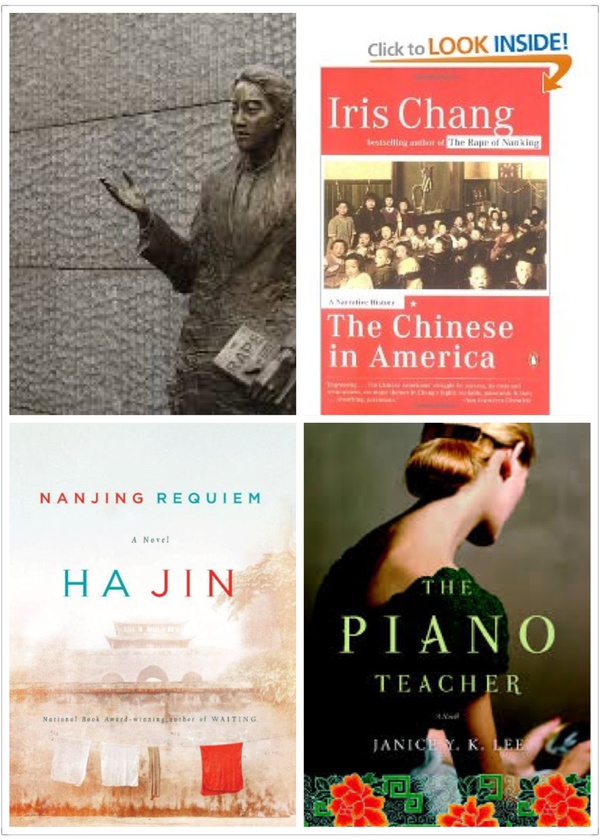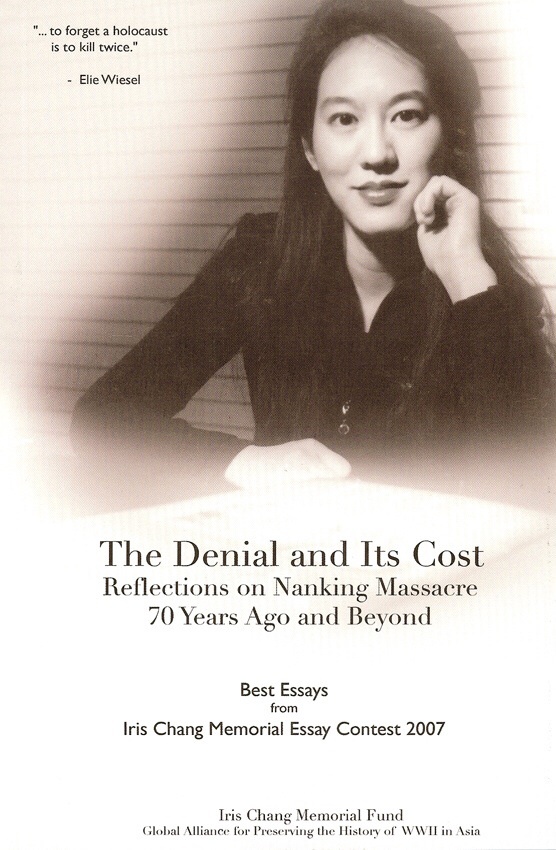李春燕谈如何做美国人(18): 高中生读南京大屠杀?请捐助抗战纪念馆
李春燕-1142 06/26 141531
4.5/414
张纯如女士说:“请相信一的力量。一个人可以改变世界,一个人可以影响百万人。Do not limit your vision, and do not ever compromise your dreams or ideals."
更新:聚沙成塔,拿出每个人的力量,怕读此书的,我们一起捐助这个纪念馆吧!凌晨看是$7,000,十小时后已$31,000。点击下面链接,几步完成捐款。先转后捐,先捐后转,up to us!
http://www.1937china.org/
朋友的女儿多才多艺,是校刊主编,舞姿优美,学业出众,被藤校录取意料之中,但个中辛苦只有自己能体会得到。而难得的是看似柔弱的女孩儿有着成熟坚强的内心,阅读大量西方历史书籍以及政治家传记等等。朋友和我都希望二代多些这样学文的。下面是朋友在她moments里的原话。
From MH:"女儿这两天读完了张纯如女士的"南京大屠杀"英文版"The Rape of Nanking"。这本书我买了至少2年了吧,她终于读了。读完后掩卷不语。我说:值得一读吗?她回答到:当然,所有美国人和中国人都应该了解这段历史。(书中张纯如的话)。当时这本书是和她母亲的回忆录一起买的,我读完了那本,却没有guts读这本。少年无惧。她说学校里只教holocaust 不说南京大屠杀。现在她知道了。下面已经定购了美国早期华人移民史的书。"
朋友的女儿多才多艺,是校刊主编,舞姿优美,学业出众,被藤校录取意料之中,但个中辛苦只有自己能体会得到。而难得的是看似柔弱的女孩儿有着成熟坚强的内心,阅读大量西方历史书籍以及政治家传记等等。朋友和我都希望二代多些这样学文的。下面是朋友在她moments里的原话。
From MH:"女儿这两天读完了张纯如女士的"南京大屠杀"英文版"The Rape of Nanking"。这本书我买了至少2年了吧,她终于读了。读完后掩卷不语。我说:值得一读吗?她回答到:当然,所有美国人和中国人都应该了解这段历史。(书中张纯如的话)。当时这本书是和她母亲的回忆录一起买的,我读完了那本,却没有guts读这本。少年无惧。她说学校里只教holocaust 不说南京大屠杀。现在她知道了。下面已经定购了美国早期华人移民史的书。"

正如张纯如女士说的:“我希望南京大屠杀进入公众的意识,除非我们真正了解这样惨绝人寰的事件如何发生的,我们不能确信它不会重演。” 这本书确实难读,但读的目的不是仅看事实,而是学作者般分析为什么会发生?张女士还在PBS电视上和日本大使辩论要他道歉。张盈盈女士在怀念女儿的回忆录中讲到这一段 (她的书"The Woman Who Could Not Forget"记载女儿生平,让我几度落泪。)
张纯茹女士,巾帼英雄。既然她已勇敢写了,我们也要勇敢去读,而后像她说的那样反思,并带到学校宣传。几年前镇上华人把这本书捐到图书馆和学区。前段文章说过我们中学Human Rights的课上,已经有讲这本书,记得儿子还把参观南京被炸的照片拿给老师和同学看。也想起我曾热血沸腾,大段地email给犹太和其他族裔朋友。看到美国政府的cover up,我也吃惊。另一本书说到在国际法庭审判时,连大法官都抨击美国的掩盖。
"After the 1949 Communist revolution in China, neither the People's Republic of china nor the Republic of China (in Taiwan) demaned wartime reparations from Japan (as Israel had from Germany) because the two governments were competing for Japanese trade and political recognition. And even the US, faced with the threat of communism in the Soviet Union and mainland China, sought to ensure the friendship and loyalty of its former enemy, Japan. "
http://www.irischang.net
http://www.amazon.com/The-Rape-Nanking-Forgotten-Holocaust/dp/0140277447
http://www.economist.com/node/3423136
这是Iris 讲她的书The Chinese in America.
http://youtu.be/Qk08ITj2hGs
http://www.amazon.com/The-Chinese-America-Narrative-History/dp/0142004170
Other comments
From YL:"CS是个有思想的孩子,希望她也会成为一个有影响力的人,不局限在亚裔圈子里。"
From MH the mom:"她的"思想"上的朋友大多是网友或夏令营认识的对人文科学感兴趣的同学,非亚裔的多。亚裔孩子学人文的太少了。"
From LZ:"这本书的出版已经很久了。我也一直没有勇气去读,因为知道读它自己会非常痛苦[流泪][流泪]"
From春燕:痛苦是的,但清醒看到各方的表现还是最重要的。犹太人的回忆录也有很痛苦的,但仍去面对,分析。http://en.m.wikipedia.org/wiki/Man's_Search_for_Meaning https://www.goodreads.com/author/quotes/2782.Viktor_E_Frankl)
"我一直没有勇气读那本书,此生也不见得有了。佩服小女孩的勇气和探索精神,是二代的model。" "[玫瑰]向张纯如女士致敬!应该让我们的孩子读" "一定是CS! [强]" http://wxs.hi2net.com/home/news_read.asp?NewsID=6742
From 春燕:上面链接是朋友写的文章。要再对说没勇气读的朋友说:不只是看事实,而是看作者的分析,和几个国家的cover up, 有利于了解人性及国家政治,尤其日德对比。看我摘的英文部分,not gruesome but very analytical.
From SS:"I have the book in the house but don't have the stomach to read it. My hubby read the book and felt sad. [流泪] It is so great to see the next generation taking that step reading the history. She is destined to be great! So proud of her!!! [玫瑰][玫瑰][玫瑰]"
From MS:"同感,已经没有勇气看这类的书或电影了[冷汗]"
From MH: "转一位南京同学写的:南京大屠杀纪念馆前有张纯茹的雕塑,她集美丽、才华和正义一身。全世界人都记住她的。"
From Chunyan:"一定要读,说说是没用的。Recommend a historical fiction by 哈金 about Minnie Vautrin. 华裔移民史应该读。前天写的Laurence Yep也可以给她推荐。也许将来她也会像Yep那样写书。”
http://www.amazon.com/Nanjing-Requiem-Novel-Vintage-International/dp/030774373X
http://youtu.be/m0QfJYg2_zg
The Piano Teacher is also very good (disturbing too)
http://www.amazon.com/The-Piano-Teacher-A-Novel/dp/0143116533
张盈盈女士怀念爱女的memoir。
http://www.amazon.com/Woman-Who-Could-Not-Forget/dp/1605981729
About Laurence Yep
http://www.weidb.com/p5207
几年前的email,我们可以用“一个人”的力量影响身边人的。
Hi all,
When Mike asked about the name of the book club discussion, I thought of something I forgot to mention for adults--Iris Chang's book "The Rape of Nanking." We visited the city in August and saw the bombed wall. The entire city, then capital of China, was almost wiped out in 7 weeks in 1937. But the worst is, there is not much account of it, except for this brave woman's book. And a memoir by a heartbroken mother. Below are some excerpts. The book does not just list historical accounts, but has provided deep thinking.
Yan
Is there a child today in any part of the US, and perhaps in many other parts of the world, who has not seen the gruesome pictures of the gas chambers at Auschwitz or read at least part of the haunting tale of the yong Anne Frank? Indeed, at least in the US, most school children are also taught about the devastating effects of the atomic bombs. But ask most Americans--children and adults alike, including highly educated adults--about the Rape of Nanking, and you will learn that most have never been told what happened in Nanking 60 years ago (1937)...
Despite the fact that the death toll in Nanking (300,000) exceeded the immediate deaths from the atomic blasts and Hiroshima and Nagasaki combined (and even the total wartime casualty count of entire European countries), the Cold War led to a concerted effort on the part of the West and even the Chinese to court the loyalty of Japan and stifle open discussion of this atrocity. Indeed, Chang characterizes this conspiracy of silence, which persists to this day, as "a second rape."
From Iris Chang: After hearing such remarks, I became terrified that the history of 300,000 murdered Chinese might disappear just as they themselves had disappeared under the Japanese occupation and that the world might actually one day believe the Japanese politicians who have insisted that the Rape of Nanking was a hoax and a fabrication. By writing this book, I forced myself to delve into not only history but historiagraphy.
Perhpas more than any other nation in history, the Germans have incorporated into their postwar political identity the concession that the wartime government itself, not just individual Nazis, was guilty of war crimes. The Japanese government, however, has never forced itself or Japanese society to do the same. Japanese textbooks have either ignored the massacre at Nanking altogether or put a decidedly Japanese spin on the actions of the military. At the far end of the political spectrum, Japanese altranationalists have threatened everything from lawsuits to death, even assassination, to silence opponents who suggest that these textbooks are not telling the next generation the real story.
"Japan's denial of the rape of Nanking would be politically the same as German denial of the Holocaust."
In 1990 Ishihara Shintaro, a leading member of Japan's conservative Liberal democaratic party denied the holocaust in Nanking, "even if the Germans had apologized for killing the Jews, that did not mean that the Japanese should do the same; under no circumstances should the Japanese ever admit they were guilty of any wrongdoing."
Not until 1994 were japanese schoolchildren taught that Hirohito's army was responsible for the deaths of at least 20 million Alled soldiers and Asian civilians.
Subsections from ch. 10 The Forgotten Holocaust: the textbook controversy--censorship; the academic cover-up; Japanese intimidation at its worst;
The Japanese imperial army endorsed policies that would wipe out everyone in certain regions in China--the "Three-all" policy ("Loot all, kill all, burn all") in northern China, where Communist Chiense guerrillas had fought the Japanese furiously and effectively. In 1941, as a result of extermining everyone in the northern Chinese countryside, the population there was reduced from 44 million to 25 million.
The Japanese also waged ruthless experiments in biological warfare against the Chinese (many biological cites are still being found in Harbin). Entire regions were targeted for disease. Japanese aviators sparyed fleas carrying plagu germs over metropolitan areas like Shanghai, Ningpo, and Changteh, and that flasks of disease-causing microbes--cholera, dysentery, typhoid, plague, anthrax, parayphoid--were tossed into rivers, wells, ersevoirs, and houses. The Japanese also mixed food with deadly germs to infect the Chinese civilian and military population. The Japanese killed more than 19 million Chinese people in its war against China.
[powerful paragraph below by Iris Chang]
The most distressing of all lies in the frightening ease with which the mind can accept genocide, turning us all into passive spectators to the unthinkable. The Rape of Nanking was front-page news across the world, and yet most of the world stood by and did nothing while an entire city was butchered. The international response to the Nanking atrocites was errily akin to the more recent response to the atrocities in Bosnia-Herzegovina and Rwanda. One could argue that the US and other countries failed to intervene earlier to prevent the Nazis from carrying out their "final solution" because the genocide was carreid out in wartime secrcy and with such cold efficiency that until Allied soldiers liberated the camps and saw with their own eyes the extent of the horrow, most people could not accept the reports they had been getting as literally true. But for the Rape of Nanking, or for the murdurs in the former Yugoslavia, there can be no such excuse. The Nanking atrocities were splashed prominently across the pages of newspapers like the New York Times, while the Bosnia outrages were played out daily on television in virtually every living room. Apparently some quirk in human nature allows even the most unspeakable acts of evil to become banal within minutes, provided only that they occur far enough away to pose no personal threat.
Sad to say, the world is still acting as a passive spectator to the second japanese rape--the refusal of the Japanese to apologize for or even acknowldege their crimes at Nanking, and the attemps by Japanese extremists to erase the event from world history.
While Germany paid almost $60 billion to victims, the Japanese have paid close to nothing.





